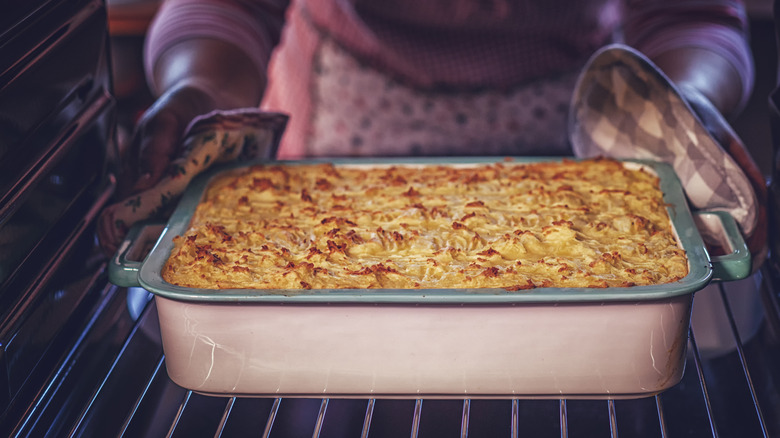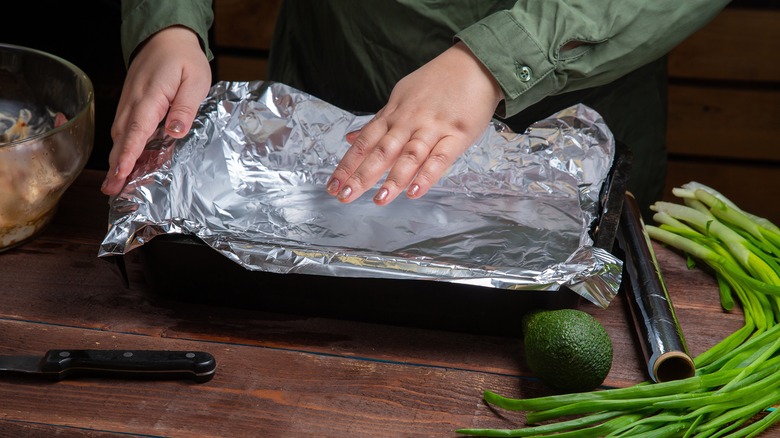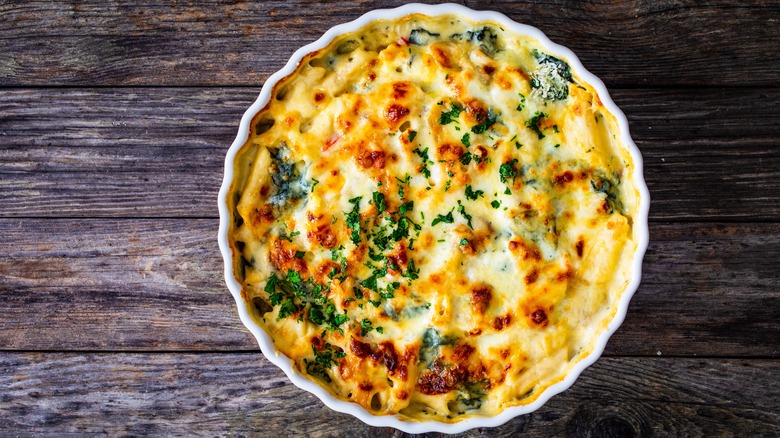Casseroles Are Perfect For Freezing, So Double Your Recipe
Pre-made casseroles are a great way to get dinner on the table when you don't have the time or desire to cook. Just preheat the oven, pop it in, and relax — or take care of more pressing matters — while it heats up. This can be a lifesaver on nights when you work late or have an evening activity planned but don't want to rely on fast food or takeout for sustenance.
Of course, just popping a pre-made casserole in the oven might sound easier said than done. But if you make a habit of doubling your casserole recipes and freezing the second one, then it's easy to keep an extra casserole on hand for when you need a simple meal that's ready in no time. Casseroles freeze pretty well for the most part, with the flavor and texture remaining consistent for most kinds, even with reheating. Frozen correctly, many taste just as good as if they've been freshly made. So you won't have to worry about any extra food or prep going to waste.
Tips for freezing a casserole
Casseroles are typically frozen after they're baked, so they just need to be warmed up, which is part of why they're so convenient. Or they can be frozen after assembly and thoroughly baked at a later point. There are some caveats, of course, but for the most part either way is fine. Just be sure to pre-cook any meat, noodles, or veggies before putting the casserole together the same as you would if you were baking it right away.
There is one important step to take ahead of time with the extra casserole regardless of whether you're baking it in advance or not — and that's to line the baking dish with foil before assembling the casserole. Use extra foil so that you can fold it over the top. Once the casserole is frozen you'll be able to pull it out by the foil and store it in the freezer without the baking dish. Just be sure to wrap it in a second layer of foil to protect it from the air before putting it back in the freezer.
If you are baking the casserole ahead of time then you'll want to ensure that it is completely cooled down before putting it in the freezer. This will prevent condensation from damaging the casserole and ensure that already frozen foods don't thaw. You'll also want to leave off any garnishes or toppings that could get soggy during the defrosting process. This includes extra cheese, breadcrumbs, crispy fried onions, and cracker toppings.
There are some casseroles you might not want to freeze
While it's perfectly acceptable to freeze any kind of casserole there are some whose texture won't remain quite intact. If you've ever had a frozen lasagna and noticed that the texture of the ricotta wasn't as creamy as expected then you'll know why. Since dairy doesn't take to super cold temperatures as well as most other foods, you may want to avoid freezing casseroles that contain a lot of soft cheese or cream. On the other hand, many freeze just fine as long as they are baked first, such as mac and cheese. Starchy or watery vegetables can also be problematic, so it's a good idea to pre-bake any casseroles with potatoes, spinach, or similar veggies.
Overall, doubling your casserole recipe so that you have one to freeze is a great way to ensure a tasty and nutritious dinner when you don't have enough time to prepare a meal. While some may freeze better than others, most will taste just as good out of the freezer as they would if they were prepared that same day. So do yourself and favor and make an extra one next time.


